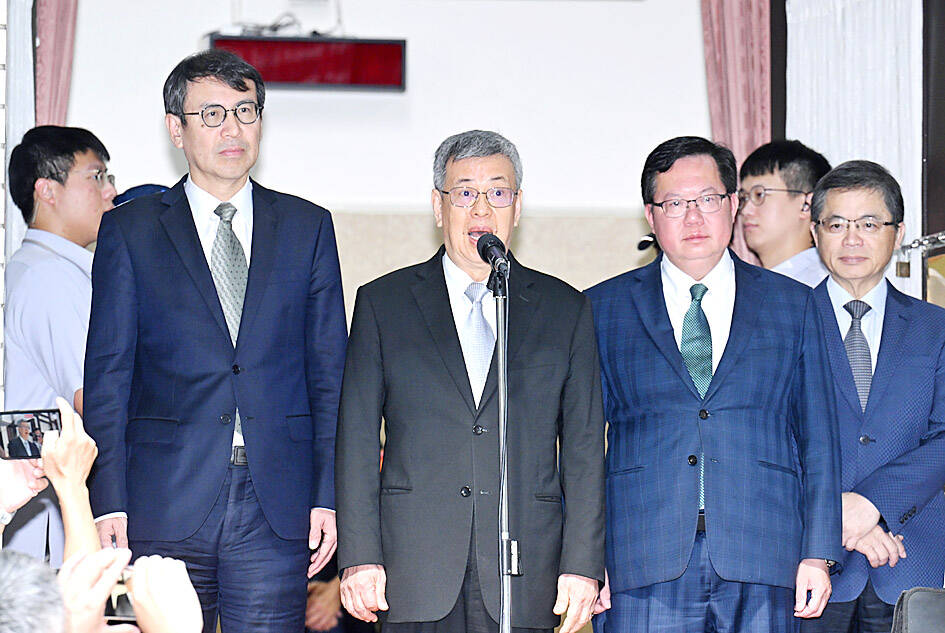The government is to raise childcare allowances by at least NT$1,500 (US$46.54) per month starting next year to try to boost the nation’s shrinking birthrate, the Executive Yuan said.
Starting on Jan. 1 next year, subsidies for parents with children younger than three attending public care centers are to be increased to NT$7,000 per month from NT$5,500, Premier Chen Chien-jen (陳建仁) was quoted as saying in a statement issued by the Cabinet late on Monday.
Those using publicly subsidized private childcare centers or home babysitting services are to receive NT$13,000 a month, up from NT$8,500, it said.

Photo: Tien Yu-hua, Taipei Times
Additional childcare subsidies are to be offered to parents with two or three children and those from low-income or lower-middle-income families, it added.
The government budget for measures to counter the declining birthrate has grown from NT$15 billion in 2016 to a projected NT$120.1 billion next year, Chen said.
During that time, the number of new births has plummeted, falling from 193,844 in 2017 to 138,986 last year, Ministry of the Interior data showed.
New births in the first eight months of this year are trending slightly lower than last year, totaling only 88,935.
The number of births last year and early this year was likely affected by the spread of COVID-19 last year, when the pandemic was at its worst in the nation, but the downtrend has been steady since 2017.
Chen said the government would also inject NT$21.9 billion to fund tuition subsidies of at least NT$35,000 a year to all students at private universities starting in February next year to bridge the gap between private and public university tuition fees.
The average annual tuition fee at a public university is about NT$11,000, compared with NT$62,000 at private universities, Ministry of Education data showed.
The Cabinet’s latest announcement came in the wake of campaign pledges by New Taipei City Mayor Hou You-yi (侯友宜), the Chinese Nationalist Party’s (KMT) presidential candidate, earlier the same day aimed at encouraging people to have more children.
Hou promised that if he is elected to implement a one-time housing subsidy of NT$1 million for households in an income tax bracket below 30 percent with three or more children and who do not own property.
Currently, households with three children who are in an income tax bracket below 20 percent are entitled to a monthly subsidy of NT$7,000.
The nation’s low birthrate has been driven by people getting married and having children at an older age, and by housing and childcare costs soaring, Hou said.
If elected, he would also offer a one-time subsidy of NT$20,000 for women aged 30 to 40 to freeze their eggs, along with an annual egg storage fee subsidy of NT$2,000 for a period of five years, or a maximum total subsidy of NT$30,000, he said.
The policy could benefit 30,000 individuals and would have a budget of NT$900 million, he added.

The Ministry of the Interior (MOI) is to tighten rules for candidates running for public office, requiring them to declare that they do not hold a Chinese household registration or passport, and that they possess no other foreign citizenship. The requirement was set out in a draft amendment to the Enforcement Rules of the Public Officials Election and Recall Act (公職人員選舉罷免法 ) released by the ministry on Thursday. Under the proposal, candidates would need to make the declaration when submitting their registration forms, which would be published in the official election bulletin. The move follows the removal of several elected officials who were

The Republic of China (ROC) is celebrating its 114th Double Ten National Day today, featuring military parades and a variety of performances and speeches in front of the Presidential Office in Taipei. The Taiwan Taiko Association opened the celebrations with a 100-drummer performance, including young percussionists. As per tradition, an air force Mirage 2000 fighter jet flew over the Presidential Office as a part of the performance. The Honor Guards of the ROC and its marching band also heralded in a military parade. Students from Taichung's Shin Min High School then followed with a colorful performance using floral imagery to represent Taiwan's alternate name

FOUR DESIGNATED AREAS: Notices were issued for live-fire exercises in waters south and northwest of Penghu, northeast of Keelung and west of Kaohsiung, they said The military is planning three major annual exercises across the army, navy and air force this month, with the navy’s “Hai Chiang” (海強, “Sea Strong”) drills running from today through Thursday, the Ministry of National Defense said yesterday. The Hai Chiang exercise, which is to take place in waters surrounding Taiwan, would feature P-3C Orion maritime patrol aircraft and S-70C anti-submarine helicopters, the ministry said, adding that the drills aim to bolster the nation’s offshore defensive capabilities. China has intensified military and psychological pressure against Taiwan, repeatedly sending warplanes and vessels into areas near the nation’s air defense identification zone and across

COVETED PRIZE: The US president would be a peace prize laureate should he persuade Xi Jinping to abandon military aggression against Taiwan, William Lai said US President Donald Trump should get the Nobel Peace Prize should he be able to convince Chinese President Xi Jinping (習近平) to abandon the use of force against Taiwan, President William Lai (賴清德) told a conservative US radio show and podcast in an interview. The US is Taiwan’s most important international backer, despite the absence of formal ties, but since Trump took office earlier this year he has not announced any new arms sales to the nation. Trump could meet Xi at the APEC summit in South Korea on Oct. 31 and Nov. 1. Lai, speaking on The Clay Travis and Buck Sexton